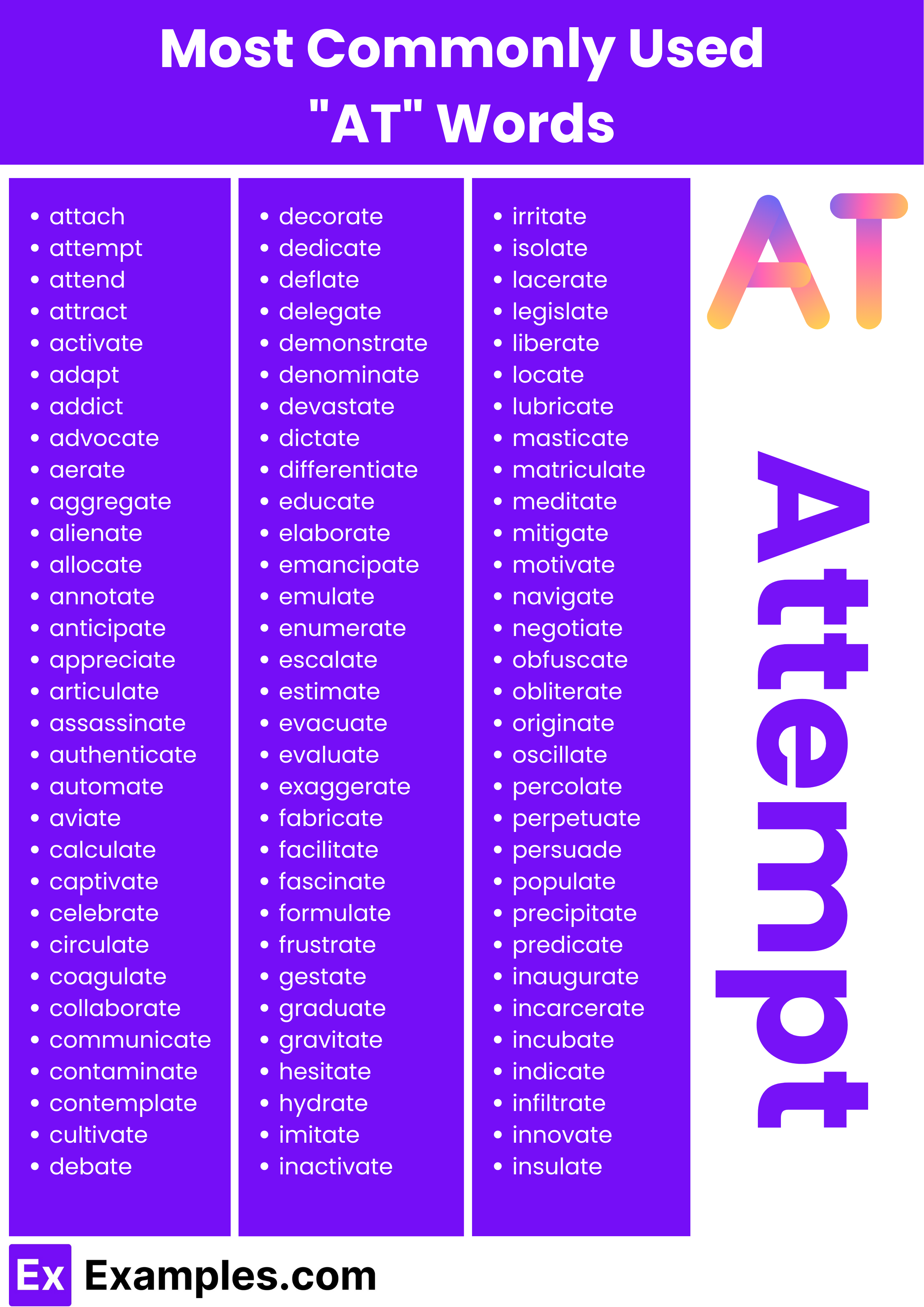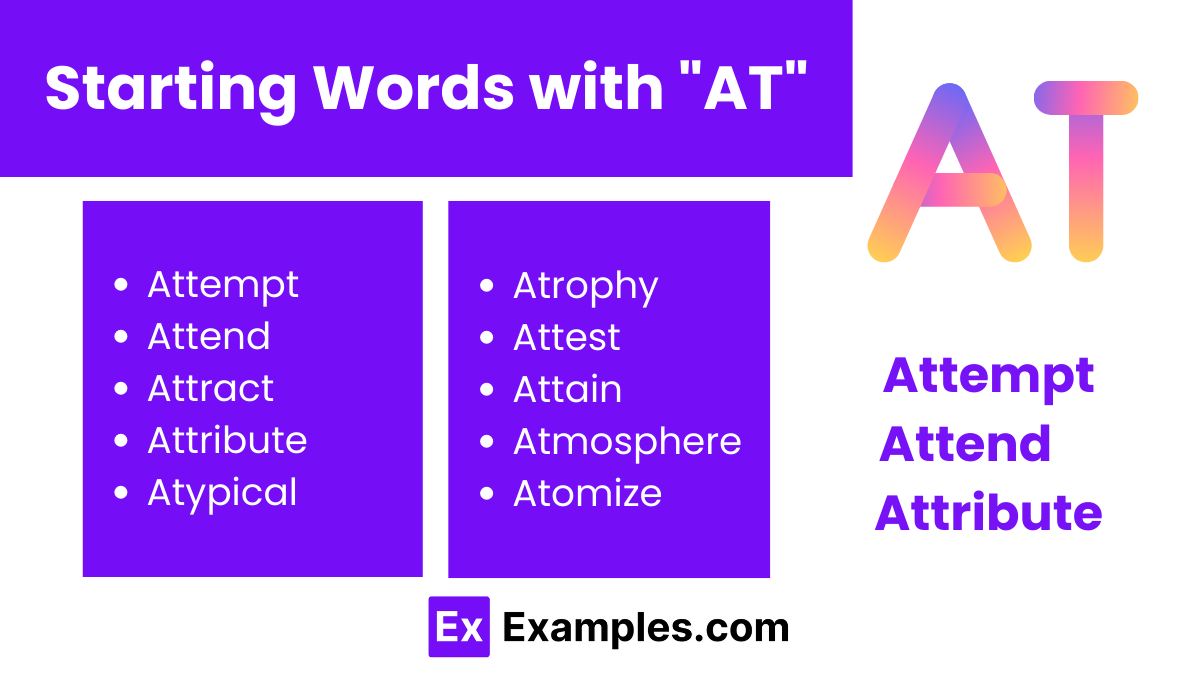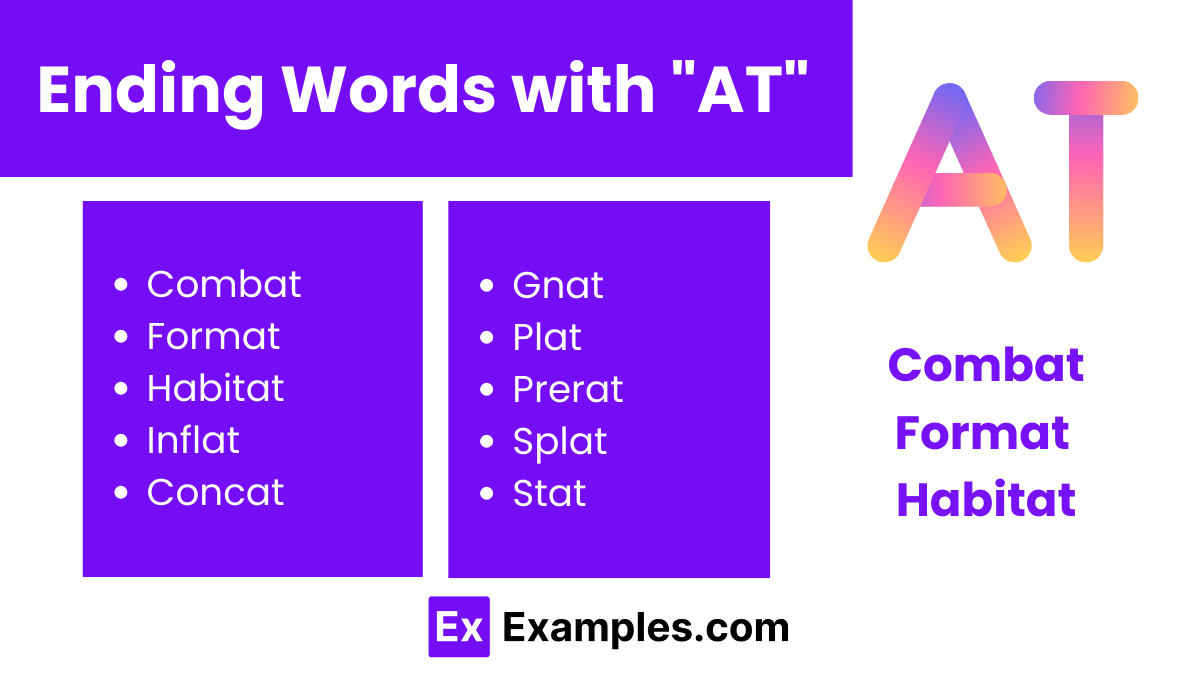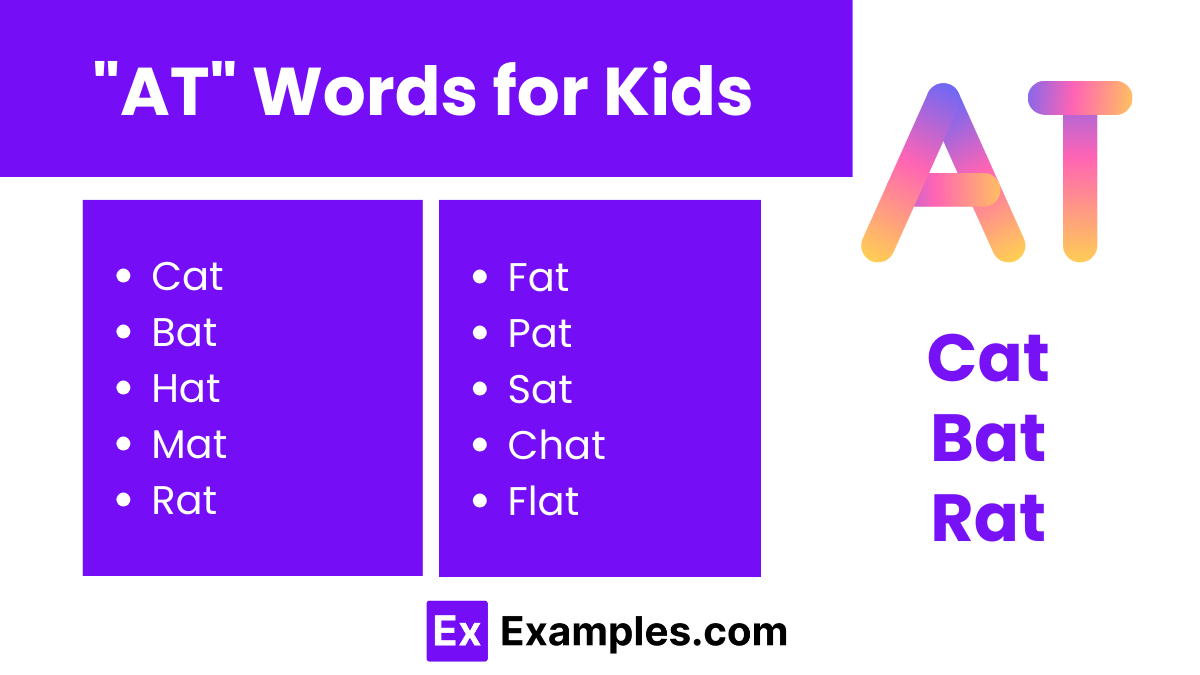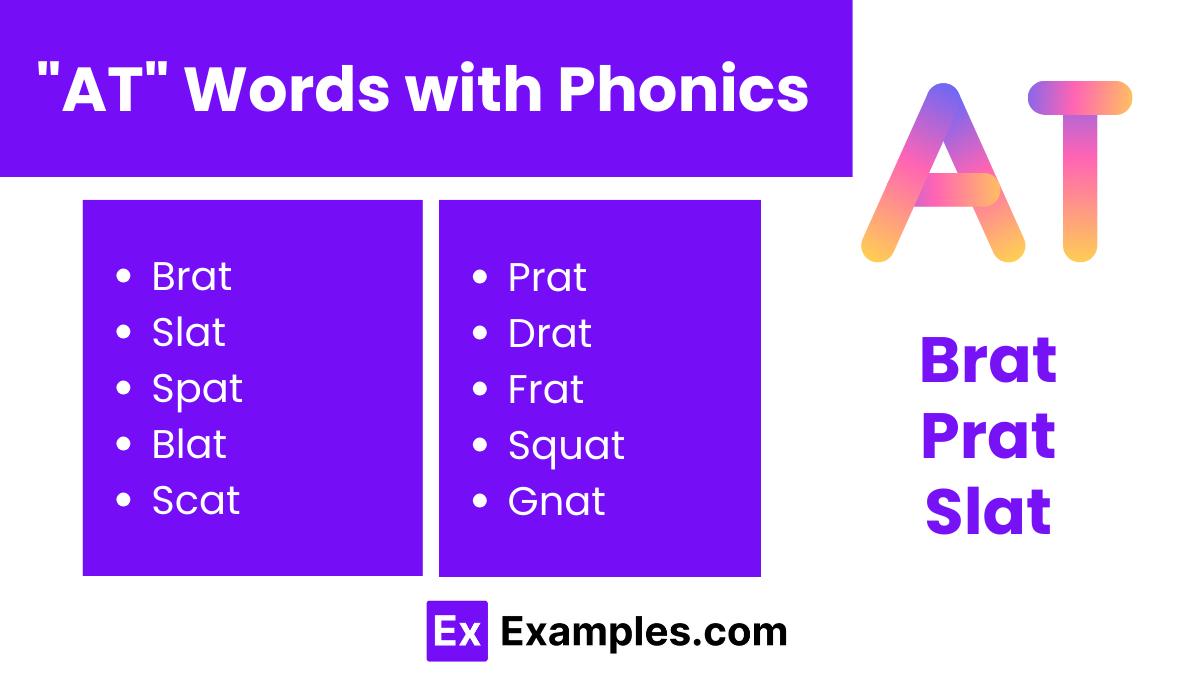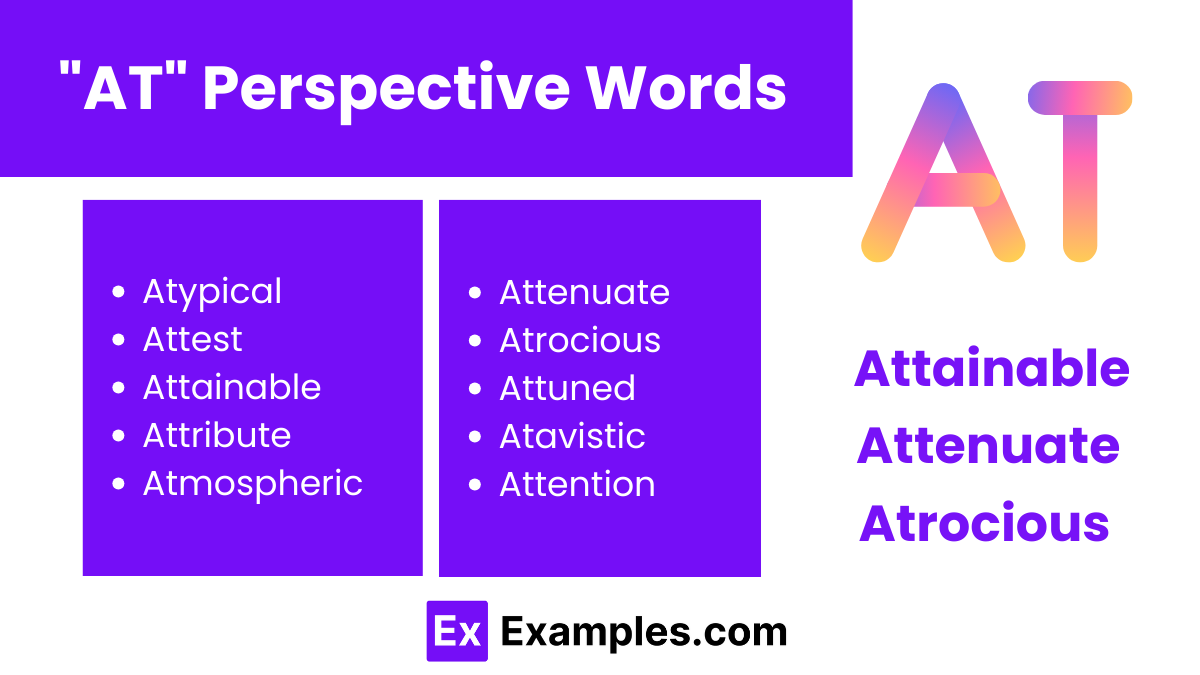AT Words
“AT Words” opens a portal to the fascinating realm where language meets creativity, offering a treasure trove of expressions that captivate and inspire. This concept delves into the nuances of words beginning with “AT,” exploring their significance, versatility, and impact on communication. From the everyday to the extraordinary, AT Words illuminate the power of language to connect, transform, and enrich our lives. Discover the hidden depths and delightful surprises these two letters hold, embarking on a journey through the artistry of the spoken and written word.
Download Most Commonly Used AT Words - PDF
Most Commonly Used “AT” Words
| attach | attempt | attend | attract | activate | adapt |
| addict | advocate | aerate | aggregate | alienate | allocate |
| annotate | anticipate | appreciate | articulate | assassinate | authenticate |
| automate | aviate | calculate | captivate | celebrate | circulate |
| coagulate | collaborate | communicate | contaminate | contemplate | cultivate |
| debate | decorate | dedicate | deflate | delegate | demonstrate |
| denominate | devastate | dictate | differentiate | educate | elaborate |
| emancipate | emulate | enumerate | escalate | estimate | evacuate |
| evaluate | exaggerate | fabricate | facilitate | fascinate | formulate |
| frustrate | gestate | graduate | gravitate | hesitate | hydrate |
| imitate | inactivate | inaugurate | incarcerate | incubate | indicate |
| infiltrate | innovate | insulate | integrate | irritate | isolate |
| lacerate | legislate | liberate | locate | lubricate | masticate |
| matriculate | meditate | mitigate | motivate | navigate | negotiate |
| obfuscate | obliterate | originate | oscillate | percolate | perpetuate |
| persuade | populate | precipitate | predicate | procrastinate | proliferate |
| propagate | prostrate | radiate | recapitulate | regulate | rehabilitate |
3 Letter “AT” Words
n the vast ocean of the English language, 3-letter “AT” words stand out as linguistic gems, offering a unique blend of brevity and versatility. These compact powerhouses pack a punch, capable of enhancing text with precision and nuance. Ideal for poets, writers, and aficionados of concise communication, 3-letter “AT” words are essential tools in the arsenal of effective language use.
- Bat – A word that can refer to a flying mammal, or a piece of sports equipment used in games like baseball and cricket.
- Cat – This term universally represents a furry, domesticated feline, beloved as a pet and known for its grace and agility.
- Fat – A versatile word, it describes a natural oily substance occurring in animal bodies, or an adjective for excess body weight.
- Hat – Symbolizing a head covering, “hat” is a fashion accessory or a protective gear against weather elements.
- Mat – Referring to a piece of fabric material placed on a floor or other flat surface, used for wiping the shoes, sitting, or decorating.
- Pat – This word can describe a gentle touch or stroke as a sign of affection or in a comforting manner.
- Rat – Often used to denote a rodent, commonly found in urban and rural areas, or a term in colloquial language to describe a betrayer.
- Sat – The past tense of “sit,” it signifies the action of taking a seated position or having been in a seat.
- Vat – A large container, typically used for holding liquids, especially in industries like dyeing, chemical processes, or brewing.
- Wat – Less commonly known, this term refers to a Buddhist temple or monastery in Cambodia, Thailand, or Laos, highlighting cultural and religious significance.
4 Letter “AT” Words
Delving deeper into the essence of concise communication, 4-letter “AT” words emerge as linguistic keystones, bridging the gap between simplicity and expressiveness. These words serve as a testament to the English language’s efficiency, offering rich semantic value within a minimalistic framework. Their utility spans across various domains, from creative writing and poetry to technical and academic writing, underscoring their versatility. Embracing these words within your linguistic toolkit can significantly amplify the clarity, impact, and precision of your communication. Explore the following ten 4-letter “AT” words that can enrich your vocabulary and elevate the quality of your content.
- Chat – A term signifying informal conversation, “chat” is pivotal in contexts ranging from digital communication platforms to casual dialogue.
- Flat – This versatile word can describe a level surface, lack of hierarchy, or a type of apartment, making it essential across various contexts.
- Gnat – Representing a tiny flying insect, “gnat” is often used in discussions about nature, environmental science, and entomology.
- Heat – A fundamental term in discussions about temperature, energy, and physical states, “heat” is crucial for scientific, culinary, and everyday contexts.
- Meat – Central to culinary arts, nutrition, and dietary discussions, “meat” refers to the flesh of animals as food.
- Neat – This word denotes cleanliness, orderliness, or something done with skill and efficiency, valuable in organizational and aesthetic discussions.
- Oath – Signifying a solemn promise, often made in a legal or ceremonial context, “oath” plays a significant role in discussions about ethics, law, and personal integrity.
- Seat – A word denoting a place to sit or the act of sitting, “seat” is widely used in contexts related to furniture, transportation, and venues.
- That – An essential connector in English grammar, “that” functions as a demonstrative pronoun or conjunction, integral for constructing complex sentences.
- What – This interrogative pronoun is crucial for forming questions, reflecting curiosity, and exploring information, making it indispensable in communication.
5 Letter “AT” Words
In the realm of English vocabulary, 5-letter “AT” words occupy a special niche, offering a blend of specificity and versatility that can significantly elevate both spoken and written communication. They serve as key components in keyword strategies, helping content creators target niche topics and improve search engine visibility. Let’s delve into ten striking 5-letter “AT” words that can add clarity, richness, and nuance to your linguistic toolkit.
- Treat – A versatile word that can refer to an act of providing pleasure or entertainment, or a special gift, often used in the context of food, experiences, or healthcare.
- Great – This word signifies something of large size, importance, or excellence, often used to describe achievements, quality, or satisfaction.
- Cheat – Referring to the act of deceiving or behaving dishonestly for personal gain, “cheat” highlights unethical actions in various contexts.
- Wheat – A fundamental agricultural product, “wheat” is crucial for global food supply, representing sustenance, agriculture, and economy.
- Splat – Evoking the sound or action of something wet striking a surface, “splat” is often used in onomatopoeic contexts or to describe a specific type of chair back design.
- Scrat – Less commonly used, this term can refer to scratch or scramble, evoking a sense of hurried searching or clawing.
- Squat – This word describes the action of crouching or the posture where one’s knees are bent and the buttocks are near the heels, also used in fitness and real estate contexts.
- Bloat – To swell or cause to swell due to fluid or gas, “bloat” is used in medical, technical, and casual contexts to describe expansion.
- Float – Signifying the ability to remain on the surface of a liquid or to move lightly and effortlessly, “float” carries both literal and metaphorical meanings.
- Treat – Emphasizing care, indulgence, or a special experience, “treat” is used in diverse contexts from healthcare to culinary and leisure activities.
6 Letter “AT” Words
Diving into the realm of 6-letter “AT” words reveals a fascinating layer of the English language, where precision meets creativity. Each word in this category holds the power to convey complex ideas succinctly, making them invaluable for creating content that’s not only keyword-rich but also highly relevant and engaging. In the world of search engine optimization, where detail and specificity can significantly boost visibility, incorporating 6-letter “AT” words into your content strategy can be a game-changer. Whether you’re crafting an article, developing a language-based AI, or optimizing a website for search engines, these 6-letter “AT” words can elevate the quality and effectiveness of your work. Let’s explore ten exemplary 6-letter “AT” words that exemplify the diversity and utility of this linguistic category.
- Abated – Suggests a reduction or decrease in intensity or amount, often used in financial, environmental, or emotional contexts.
- Berate – To scold or criticize someone fiercely, a word that conveys intense emotion and reaction.
- Crated – Refers to the action of packing or storing items in a crate, highlighting processes of organization and transport.
- Defeat – Signifying a loss or failure, especially in competitive contexts, this word is powerful in discussions of challenge and resilience.
- Equate – Implies considering one thing to be the same as another, a concept crucial for logical reasoning and mathematical discussions.
- Frustr – Although less common, it hints at the root of “frustrate,” evoking feelings of being upset or annoyed by inability to change or achieve something.
- Grated – Describes reducing something to small shreds by rubbing it on a grater, often used in culinary contexts.
- Heated – Indicates something made warm or hot, also metaphorically used to describe intense discussions or arguments.
- Innate – Denotes qualities or abilities that one is born with, emphasizing natural characteristics or talents.
- Jubate – A less commonly used word, referring to having a mane or mane-like feature, showing the diversity of English vocabulary.
7 Letter “AT” Words
iving deeper into the richness of the English language, 7-letter “AT” words present an intriguing category that balances complexity with accessibility. These words, rich in meaning and versatility, are indispensable for writers, educators, and language enthusiasts aiming to refine their communication. By incorporating these 7-letter treasures, you can elevate your language use, making your writing more engaging, instructive, and keyword-rich.
- Abreact – A psychological term referring to the expression and release of previously repressed emotion, beneficial in therapeutic contexts.
- Catboat – A sailing term, describing a small boat equipped with a single sail on a single mast, popular for its simplicity and agility.
- Dilatant – Pertaining to a substance that increases in viscosity and solidifies when under stress, often discussed in material science.
- Emanate – To flow out, issue, or proceed, as from a source or origin; used metaphorically to describe qualities or values that appear to radiate from a person or thing.
- Falcate – Describing something that is curved like a sickle; often used in botanical and zoological contexts to describe shapes.
- Gestate – A term used in biology and medicine, indicating the process of gestation or pregnancy, but metaphorically can refer to the development of ideas over time.
- Habitat – Refers to the natural environment in which a plant or animal species lives, crucial in ecology and conservation discussions.
- Inchoate – Describing something in an initial stage, not fully formed or developed; often used to discuss ideas or plans.
- Jubilate – A verb that means to show or feel great joy; often used in literary contexts to express celebration or jubilation.
- Keratose – Relating to, or containing keratin, a protein found in hair, skin, and nails, important in discussions of biology and dermatology.
8-Letter “AT” Words
In the realm of English vocabulary, 8-letter “AT” words stand as a testament to the language’s depth and diversity. By weaving these 8-letter marvels into your linguistic fabric, you can achieve greater precision, evoke stronger imagery, and convey more nuanced ideas. Let’s delve into ten 8-letter “AT” words that will add clarity, depth, and vibrancy to your communication endeavors.
- Cataract – Refers to a medical condition where the lens of the eye becomes progressively opaque, leading to blurred vision, or to a large waterfall, symbolizing power and flow.
- Diplomat – A person appointed by a state to conduct diplomacy with other states or international organizations, embodying negotiation and tact.
- Emanated – The past tense of emanate, indicating something that has issued or spread out from a source, useful in discussions of origin and influence.
- Flatware – Typically used to describe utensils like forks, knives, and spoons that are used at the dining table, essential in contexts of hospitality and dining.
- Gratuity – A sum of money given to someone as a reward for their services, highlighting the concepts of generosity and appreciation.
- Habitual – Describing practices or behaviors that are regular, customary, and often repetitive, crucial in discussions of psychology and habit formation.
- Inamorata – A woman with whom one is in love or has an intimate relationship, often used in literary and romantic contexts.
- Jubilated – The past tense of jubilate, indicating a state of joy or celebration that has been experienced, suitable for expressive and emotive content.
- Location- seems like you’re asking about the meaning of the word “location.” In English, “location” refers to a particular place or position.
- Mutilated – Describes something that has been severely damaged or disfigured, often used in medical, legal, or descriptive contexts concerning harm or alteration.
9-Letter “AT” Words
Navigating through the English language, 9-letter “AT” words offer a fascinating exploration of vocabulary that is both rich and complex. These terms not only help in crafting content that stands out but also in fine-tuning the semantic understanding in NLP applications, ensuring that machines can grasp the nuances of human language. Incorporating these words into your lexicon allows for a more nuanced expression of ideas, enhancing clarity, and adding depth to your narratives. Below is a selection of ten 9-letter “AT” words that are perfect for enriching your vocabulary and elevating the quality of your written and verbal communication.
- Automates – Refers to the process of making an apparatus, process, or system operate automatically through the use of technology, reducing the need for human intervention.
- Catalysts – Substances that increase the rate of a chemical reaction without themselves undergoing any permanent chemical change, or figuratively, anything that precipitates an event or change.
- Chocolates – Confectionery products made from cocoa beans, often sweetened and used as treats or in baking, celebrated worldwide for their rich taste.
- Creatures – Living beings, either animals or humans, often referred to in contexts highlighting characteristics, behaviors, or fantastical elements.
- Educators – Individuals who provide education or instruction, typically teachers or professors, crucial in the development of skills and knowledge.
- Emanating – Originating from or being produced by something, used to describe something that issues or spreads out from a source.
- Emulating – Attempting to match or surpass someone or something, often by imitation, highlighting the effort to replicate the success or qualities of another.
- Gratified – Giving pleasure or satisfaction, often used to describe feelings of contentment or being pleased as a result of receiving what was desired or worked for.
- Lactating – Producing milk in the mammary glands, specifically referring to the period after childbirth when a mother’s body produces milk for feeding her baby.
- Saturated – Completely soaked with liquid, having no capacity to absorb more, or in chemistry, referring to organic compounds where the carbon atoms are fully bonded to hydrogen or other atoms, with no double or triple bonds.
10 Letter “AT” Words
Diving into the intricacies of the English language, 10-letter “AT” words offer a fascinating blend of complexity and specificity, making them a goldmine for enthusiasts aiming to refine their lexicon. By integrating these 10-letter expressions into your repertoire, you can elevate your language use, achieving greater precision and depth in your writing.
- Attraction – Refers to the action or power of evoking interest, pleasure, or liking for someone or something, essential in discussions of psychology and marketing.
- Automating – The process of making a system or process operate automatically, crucial in technology, manufacturing, and software development contexts.
- Calibration – The action or process of accurately determining and adjusting the values of a measuring instrument, vital in scientific research and engineering.
- Celebrated – Acknowledged widely for one’s achievements or the quality of something, often used in cultural, artistic, and historical narratives.
- Deactivated – The process of making something inactive or inoperative, a term frequently encountered in technology, security, and biochemical fields.
- Evacuation – The action of evacuating a person or a place, critical in emergency management, military operations, and disaster response scenarios.
- Fabricated – Invented or concocted, typically with deceitful intent, or manufactured in an industrial context, relevant in legal, storytelling, and manufacturing discussions.
- Irritating – Causing annoyance, impatience, or mild anger, a term widely used in medical, psychological, and everyday communication contexts.
- Meditation – The practice of focusing one’s mind for a period of time, in silence or with the aid of chanting, for relaxation or spiritual growth, important in health, wellness, and spiritual discussions.
- Navigating – The process of accurately determining one’s position and planning and following a route, essential in discussions of travel, technology, and personal development.
11 Letter “AT” Words
The English language is a treasure trove of words that allow for precise and nuanced expression, with 11-letter “AT” words standing out for their specificity and depth. These words, rich in meaning and variety, are perfect for professionals, writers, and linguists aiming to refine their communication skills. By integrating these 11-letter “AT” words into your vocabulary, you can convey complex ideas more effectively, enrich your writing with detailed descriptions, and craft content that resonates with a discerning audience.
- Affirmation – A statement or sign that something is true. Affirmation is powerful in motivational contexts and when confirming commitments or beliefs.
- Conflagrate – To catch fire or cause something to catch fire. Conflagrate is often used metaphorically to describe situations that suddenly become intense or out of control.
- Exasperated – Feeling of intense irritation or annoyance. Exasperated captures the human emotional spectrum in narratives or descriptions of frustrating situations.
- Fascination – The state of being intensely interested or attracted by someone or something. Fascination is key in writing that aims to captivate or enchant the audience.
- Gratuitously – Done without good reason; uncalled for. Gratuitously is applicable in discussions about actions or remarks that are unnecessary or unwarranted.
- Illustration – A picture or diagram that helps make something clear or attractive. Illustration is crucial in both artistic and explanatory contexts.
- Matriculate – To enroll in a college or university. Matriculate is essential in academic contexts, signifying the beginning of a higher education journey.
- Perpetuated – Made something, typically an undesirable situation or an unfounded belief, continue indefinitely. Perpetuated often appears in discussions of social issues and history.
- Ratiocinate – Think, reason, or argue logically and methodically. Ratiocinate is a sophisticated way to describe the process of logical thinking or reasoning.
- Satisfaction – Fulfillment of one’s wishes, expectations, or needs, or the pleasure derived from this. Satisfaction is a versatile word used in both personal and professional contexts.
12 Letter “AT” Words
Delving into the domain of 12-letter “AT” words reveals a layer of linguistic precision that is unmatched, offering a treasure trove for enthusiasts of the English language. These words, characterized by their specific length and complexity, are a boon for writers, educators, and linguists striving to achieve accuracy and depth in their communication. Let’s explore ten meticulously selected 12-letter “AT” words that embody this linguistic excellence.
- Illustrated – A word that conveys the action of explaining or making something clear by using examples, pictures, or diagrams, enhancing the understanding and appeal of textual content.
- Concatenates – Refers to the process of linking things together in a series or chain, widely used in computing and programming to join strings, data, or elements.
- Exasperated – Describes a feeling of intense irritation or annoyance, capturing the depth of human emotions in narrative and descriptive writing.
- Refrigerated – Pertains to the act of keeping something cool in a fridge, ensuring its preservation, crucial in discussions about food safety and technology.
- Meditatively – Adverb describing an action done with deep thought or contemplation, invoking a sense of calm and introspection in literary contexts.
- Triangulated – Involves dividing an area into triangles for surveying or to determine a position based on the geometry of triangles, significant in geography and navigation.
- Acculturated – Refers to the process of adapting or adjusting to a new culture, highlighting themes of identity, integration, and cultural exchange.
- Backscattered – Describes the reflection or scattering of particles or waves back to the direction from which they came, important in physics and engineering.
- Incarcerated – Pertains to being confined in prison, touching upon legal, social, and human rights issues in both literal and metaphorical contexts.
- Unsaturated – Chemically describes a compound having at least one double or triple bond, offering richness to discussions in chemistry and.
13-Letter “AT” Words
The exploration of 13-letter “AT” words offers a unique opportunity to enhance your vocabulary with terms that are not only specific and descriptive but also rich in meaning. Incorporating such words into your content can significantly improve its quality, making it more engaging, informative, and keyword-rich. Here are ten 13-letter “AT” words, each followed by a brief definition:
- Rationalized – Made rational or logical.
- Matriculation – The action of enrolling at a college or university.
- Gratification – Pleasure, especially when gained from the satisfaction of a desire.
- Concatenation – Linking together in a chain or series.
- Stratification – The arrangement or classification of something into different layers or strata.
- Automatization – The process of making an action or process automatic.
- Exasperation – A feeling of intense irritation or annoyance.
- Inauguration – The beginning or introduction of a system, policy, or period.
- Naturalization – The admittance of a foreigner to the citizenship of a country.
- Prevarication – The act of lying or evading the truth.
14 Letter “AT” Words
14-letter “AT” words stand at the intersection of complexity and clarity, offering nuanced expressions for precise communication. Leveraging such vocabulary can elevate academic, professional, and creative writing, providing clarity and engagement to your audience. Here are ten 14-letter “AT” words with their meanings:
- Collaboration – Working together to create or produce something.
- Congratulation – An expression of praise for an achievement or good wishes.
- Dissemination – The act of spreading something, especially information, widely.
- Procrastination – The action of delaying or postponing something.
- Rationalization – The process of making something reasonable, logical, or acceptable.
- Rehabilitation – The action of restoring someone to health or normal life through training and therapy.
- Miscalculation – An incorrect calculation.
- Unsatisfactory – Not satisfactory; not good enough.
- Characterization – The creation or construction of a fictional character.
- Demonstration – An act of showing that something exists or is true by giving proof or evidence.
15 Letter “AT” Words
15-letter “AT” words embody the art of articulation, offering expansive and detailed expressions for sophisticated communication. They serve as invaluable tools for writers, researchers, and communicators aiming to convey complex ideas with accuracy and depth. Here are ten 15-letter “AT” words accompanied by short definitions:
- Misarticulation – Incorrect formation or pronunciation of words.
- Discombobulated – Confused, disconcerted, or upset.
- Insubordination – Defiance of authority; refusal to obey orders.
- Uncharacteristic – Not typical of a particular person or thing.
- Disproportionate – Too large or too small in comparison with something else.
- Rehabilitation – The process of helping someone to live a healthy, useful, or active life again after they have been seriously ill or in prison.
- Congratulatory – Expressing congratulations.
- Predestination – The divine foreordaining of all that will happen.
- Transliteration – The process of converting a text from one script into another.
- Miscalculation – A mistake in planning or forecasting something.
Starting Words with “AT”
Words that start with “At” possess the unique ability to instantly captivate and engage readers, setting the stage for compelling narratives and discussions. By strategically using these “At” starting words, you can improve your content’s discoverability and readability, making it more appealing to both search engines and human audiences. Whether you’re aiming to inform, persuade, or entertain, beginning your sentences with these words can lend an authoritative and engaging tone to your writing.
- Attempt – To make an effort to achieve or complete a task or challenge.
- Attend – To be present at an event or activity.
- Attract – To draw by appeal or allure, often used in the context of attention or interest.
- Attribute – To regard something as being caused by someone or something.
- Atypical – Not representative of a type, group, or class; unusual or uncommon.
- Atrophy – A decrease in size or wasting away of a body part or tissue.
- Attest – To provide or serve as clear evidence of something.
- Attain – To achieve, accomplish, or reach a goal or standard.
- Atmosphere – The envelope of gases surrounding the earth or another planet; or, a pervading tone or mood of a place, situation, or work of art.
- Atomize – To convert into very fine particles or droplets; or, to break down into discrete elements.
Ending Words with “AT”
Words that end with “At” carry a rhythmic cadence and a definitive closure, making them ideal for impactful endings and memorable statements. Tailoring your language with such words not only enriches your vocabulary but also optimizes your writing for search engines and natural language processing algorithms, making your content more discoverable and engaging. By carefully selecting these words to conclude your sentences or thoughts, you can create a resonant and lasting impression on your readers.
- Combat – To fight against or oppose in a battle or conflict.
- Format – The arrangement, organization, or layout of something.
- Habitat – The natural environment in which a plant or animal species lives.
- Inflat – Less common, but refers to the act of inflating or the state of being inflated.
- Concat – Short for concatenate, meaning to link things together in a series or chain.
- Gnat – A small flying insect that resembles a mosquito.
- Plat – A plot or a plan, especially of land.
- Prerat – A term not commonly used in modern English, but could refer to something prior to a ratification or agreement.
- Splat – The sound made by something wet or soft hitting a surface.
- Stat – Abbreviation for ‘statim’, meaning immediately or instantly in medical terms.
“AT” Words for Kids
Introducing “At” words to kids is a fantastic way to enrich their vocabulary and enhance their reading skills in a fun, engaging manner. These simple yet essential words form the building blocks of literacy and can significantly aid in the development of early reading strategies. By focusing on “At” words, children can quickly learn to recognize patterns, sounds, and the structure of words, making reading a more accessible and enjoyable activity.
- Cat – A small, domesticated, furry animal with whiskers.
- Bat – A piece of sports equipment used in games like baseball, or a nocturnal flying mammal.
- Hat – A head covering worn for various purposes, including protection against the weather or as a fashion accessory.
- Mat – A piece of fabric or material placed on the floor for people to sit or step on.
- Rat – A rodent that is larger than a mouse, often found living in both urban and rural areas.
- Fat – A natural oily substance found in animal bodies, or used to describe something or someone as having excess flesh.
- Pat – To touch lightly and quickly, or a small, soft tap with the hand.
- Sat – The past tense of sit, meaning to have been seated.
- Chat – To talk in a friendly and informal way.
- Flat – Having a level surface; without raised areas or indentations.
“AT” Words with Phonics
Focusing on “At” words through phonics is pivotal in enhancing children’s phonemic awareness, a critical component of early reading skills. By exploring new “At” words without repeating previous examples, we can broaden the linguistic horizon for young learners, aiding their understanding of word patterns and sound relationships. This approach helps in seamlessly blending sounds together, fostering a robust foundation for reading and spelling.
- Brat (/bræt/) – A child, often one regarded as mischievous or unruly.
- Slat (/slæt/) – A thin, narrow piece of wood, metal, or other material, typically one of a series used to construct something.
- Spat (/spæt/) – A small argument or dispute.
- Blat (/blæt/) – To make a bleating sound, like a sheep or goat.
- Scat (/skæt/) – To go away quickly; also relates to jazz singing with improvised, rapid vocal sounds.
- Prat (/præt/) – Silly or foolish behavior.
- Drat (/dræt/) – An expression of annoyance.
- Frat (/fræt/) – Short for “fraternity,” a group of people sharing a common profession or interests.
- Squat (/skwɒt/) – To crouch or sit with one’s knees bent and one’s heels close to or touching one’s buttocks or the back of one’s thighs.
- Gnat (/næt/) – A tiny flying insect that swarms in large numbers, often in damp or humid conditions.
“AT” Perspective Words
In the realm of language, “At Perspective” words play a crucial role in shaping our understanding, communication, and interpretation of various subjects and situations. These words are pivotal in offering insights, expressing viewpoints, and enriching narratives, making them invaluable for creating content that is engaging, thought-provoking, and rich in context.
- Atypical – Not typical, usual, or regular; unusual in a way that is interesting or requires further examination.
- Attest – To provide or serve as clear evidence of something, offering a perspective grounded in proof or experience.
- Attainable – Capable of being achieved, suggesting a perspective of possibility and achievability.
- Attribute – A quality or feature regarded as a characteristic or inherent part of someone or something, providing a basis for understanding and evaluation.
- Atmospheric – Relating to the atmosphere; creating a specific mood or setting, often used to describe the ambient or pervasive tone of a situation.
- Attenuate – To reduce the force, effect, or value of something, offering a perspective on diminishing impact or intensity.
- Atrocious – Horrifyingly wicked or of very poor quality, providing a perspective on extremity or severe negativity.
- Attuned – Make receptive or aware of something, suggesting a perspective of sensitivity and responsiveness.
- Atavistic – Relating to or characterized by reversion to something ancient or ancestral, offering a perspective that looks back to historical precedents or instincts.
- Attention – The act or state of applying the mind to something, providing a perspective focused on concentration, awareness, or consideration.
“At” words offer a rich tapestry of language, enhancing our ability to convey precise meanings, emotions, and perspectives. From atypical to attention, these words empower writers and speakers to articulate nuanced viewpoints, engage audiences, and enrich narratives. Harnessing the power of “At” words can elevate our communication, making it more vibrant, insightful, and impactful in every context.




